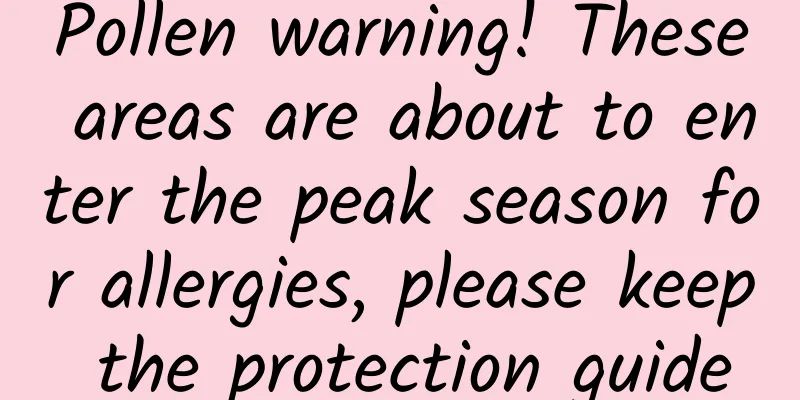Pollen warning! These areas are about to enter the peak season for allergies, please keep the protection guide

|
Spring is a season when everything comes back to life. However, behind the colorful scene, pollen allergies are also a problem. So why is spring a high-incidence season for pollen allergies? How can we deal with it scientifically and effectively? As the temperature warms up, flowers bloom and pollen in the air becomes the number one "enemy" for people with allergies. Pollen allergy, also known as hay fever, is a common spring allergic disease with symptoms including nasal congestion, runny nose, sneezing, red and swollen eyes, itching, coughing, etc., and may even trigger asthma. According to statistics, during the pollen transmission period, pollen allergy patients account for 32.3% of the total number of allergic people. Copyright images in the gallery. Reprinting and using them may lead to copyright disputes. Flowers in nature are divided into "insect-pollinated flowers" and "wind-pollinated flowers". "Insect-pollinated flowers" such as peach and apricot flowers are mainly spread by insects because their pollen particles are large, sticky, and heavy. They are not easily blown away by the wind and rarely cause allergic symptoms. However, the pollen of trees such as juniper, poplar, willow, and elm belongs to "wind-pollinated flowers". The pollen is light in weight and large in quantity. After being blown by the wind, it floats in the air in large quantities and is easy to cause allergies. The degree of pollen allergy is closely related to pollen concentration, which is related to meteorological factors. In spring, sunny, low-humidity, and stable wind speed weather are most suitable for pollen transmission. The pollen allergy meteorological index developed by the Tianjin Meteorological Bureau is divided into four levels. Level 1 indicates the beginning of the pollen season, and those with a history of allergies are advised to prepare medicine; Levels 3 to 4 indicate the pollen outbreak period, and it is recommended to reduce outdoor activities and strengthen personal protection. According to the national pollen forecast released by the China Meteorological Administration Public Meteorological Service Center this year: Nationwide Cupressaceae Pollen Forecast Forecast of the beginning of pollen bloom of weeping willows in China Beijing, Tianjin, central Hebei, southwestern Inner Mongolia, central Shanxi, northern Shaanxi, northern Gansu and other places will enter the Cupressaceae pollen period; southern Hebei, southern Shandong, southern Shanxi, southern Shaanxi, southern Gansu, western Sichuan and other places will enter the weeping willow pollen period. To effectively deal with pollen allergies, people with allergies can pay attention to the pollen allergy meteorological index released by the meteorological department and take precautions in advance. Wear a mask and goggles when going out; after returning home, change clothes, wash your face and hands in time to reduce the residue of pollen on the body; you can also use anti-allergic drugs or nasal sprays to relieve allergic symptoms. If the allergic symptoms significantly affect work and life, or are worse than before, you should seek medical attention in time. Planning and production Source: China Meteorological Administration Editor: Wang Mengru Proofread by Xu Lailinlin Note: The cover image is a copyrighted image. Reprinting it may lead to copyright disputes. |
<<: How hard have scientists tried to "sneak a peek" at those fat black and white guys?
>>: Ancient beverages are also becoming trendy? When tea starts to become instant
Recommend
The hydrogen cup can produce hydrogen water, and drinking it can prevent cancer? The truth is...
gossip "The hydrogen cup can produce hydroge...
The effect of drinking dried Lingzhi in water
We need to replenish the lack of water in the bod...
What are the medicinal values of Metasequoia
Metasequoia trees are basically distributed in th...
What are the medicinal values of donkey skin?
Many people don’t know what donkey skin glue is. ...
#千万IP创科学普# Why do people in southern Fujian like to say "only hard work can lead to success"?
When you lose your will, you can't help but c...
It is a striking orange color, why is it called a "black box"?
Black Box Flight Data Recorder Can record the air...
Visibility is too low, can't see the runway clearly? There is a "secret trick" for the plane to land
On a calm night, a gentle breeze blew quietly ove...
The efficacy and function of large-leaf white paper fan
Large-leaf white paper fans are very familiar to ...
Can I drink Sanbai Soup during my menstrual period?
Many women used to have normal and regular menstr...
Can myopia be reduced from 800 degrees to 100 degrees? The truth is different from what you think
Author: Jin Xin, Director of the Shouyang Myopia,...
What are the functions and effects of raw Rehmannia?
Shengdihuang itself is a traditional Chinese medi...
What is Atractylodes macrocephala
Atractylodes is a common traditional Chinese medi...
What is the best thing to stew with Cordyceps
There are many kinds of nutritious soups we consu...









